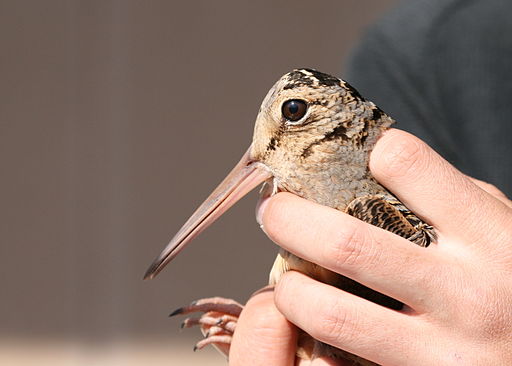Drumming up worms - the American woodcock
By Judy Evans
@JudyEv (325755)
Rockingham, Australia
February 15, 2018 9:46pm CST
The curiosities of the animal kingdom fascinate me and I’ve done a lot of articles over the years about various creatures. One which I found very intriguing was the American Woodcock (Scolopax minor). I wrote about this bird on both Bubblews and Infobarrel and thought, as we have so many Americans on myLot, that I would share it here.
This chunky shorebird is also known as the timberdoodle, night partridge, bogsucker and hokumpoke. It is the only woodcock species in North American and spends most of its time on the ground. It is well adapted to finding worms in the ground. The beak is between 2 and 3 inches long and has a flexible tip. The end has sensitive nerve endings and it can tell when it has a worm in its grasp. To find worms, it will rock back and forth without moving the head. Stepping heavily on the ground with the front foot makes the worms move around. Their exact position is then easier to find.
A unique arrangement of muscles and bones enables the birds to open and close the tip of their beak while it is in the ground. The tongue and underside of the top mandible are rough giving them better grip on slippery prey
Males, when looking to attract a mate, have individual 'singing grounds'. At dusk, the males will circle high in the air while singing. They twitter continually then will plunge in a zigzag fashion towards the ground. The outer wing feathers make a loud noise as he plummets down. American woodcocks also have a few tricks up their sleeve when food is scarce during dry seasons.
Earthworms disappear deeper into the ground during dry weather as they follow the moist layers of earth. When it rains, the drumming of the raindrops brings the earthworms to the surface so they won't drown. The woodcock will drum on the surface with its feet, fooling the worms into thinking that it is raining.
So have any American readers witnessed the singing grounds of these birds? Do you know of them at all?
The image is from Wikimedia courtesy Matt MacGillivray (https://www.flickr.com/photos/qmnonic/2497494899/) [CC BY 2.0 (http://creativecommons.org/licenses/by/2.0)], via Wikimedia Commons
14 people like this
13 responses
@LadyDuck (458006)
• Switzerland
16 Feb 18
You are right that the earthworms disappear into the ground during dry weather. It is incredible how this smart birds are capable to fool them and make them come up on the surface. I did not remember I have read this discussion in Bubblews.
2 people like this
@snowy22315 (169940)
• United States
16 Feb 18
I don't know much about this particular species. They seem like one interesting bird!
2 people like this
@JudyEv (325755)
• Rockingham, Australia
16 Feb 18
Have you ever heard of them? I wondered if perhaps they were very common but maybe only in some areas.
@andriaperry (116860)
• Anniston, Alabama
16 Feb 18
I have never seen one of those birds.
2 people like this
@teamfreak16 (43421)
• Denver, Colorado
21 Feb 18
I have never heard of it, not even any of it's nicknames.
1 person likes this
@dgobucks226 (34356)
•
17 Feb 18
Very interesting how the bird searches out worms. I wonder if they visit the state of New Jersey to breed. I have seen other areas of the U.S. mentioned. I don't believe I have ever seen one.
1 person likes this
@JudyEv (325755)
• Rockingham, Australia
20 Feb 18
@dgobucks226 We provide water for the native birds around here but they never seem to need feeding. I can put out feed but mostly it remains untouched.
1 person likes this
@dgobucks226 (34356)
•
21 Feb 18
@JudyEv I have a captive audience at my feeder! 

1 person likes this

@shaggin (71664)
• United States
16 Feb 18
We do have woodcocks that hang out on the ground certain times if the year. They look similar to this. I have never noticed the music they make though. When I told my boyfriend years ago about this bird hanging around on the ground I thought he was pulling my leg about the name 

1 person likes this
@JamesHxstatic (29242)
• Eugene, Oregon
16 Feb 18
Since they are mostly in the eastern half of the country and I have never been there, I know nothing about woodcocks.
1 person likes this
@JudyEv (325755)
• Rockingham, Australia
16 Feb 18
I'm glad in a way. I never know if I'm 'preaching to the converted' type of stuff. 

@JohnRoberts (109857)
• Los Angeles, California
16 Feb 18
I have never even heard of this bird.
1 person likes this











 .
.







